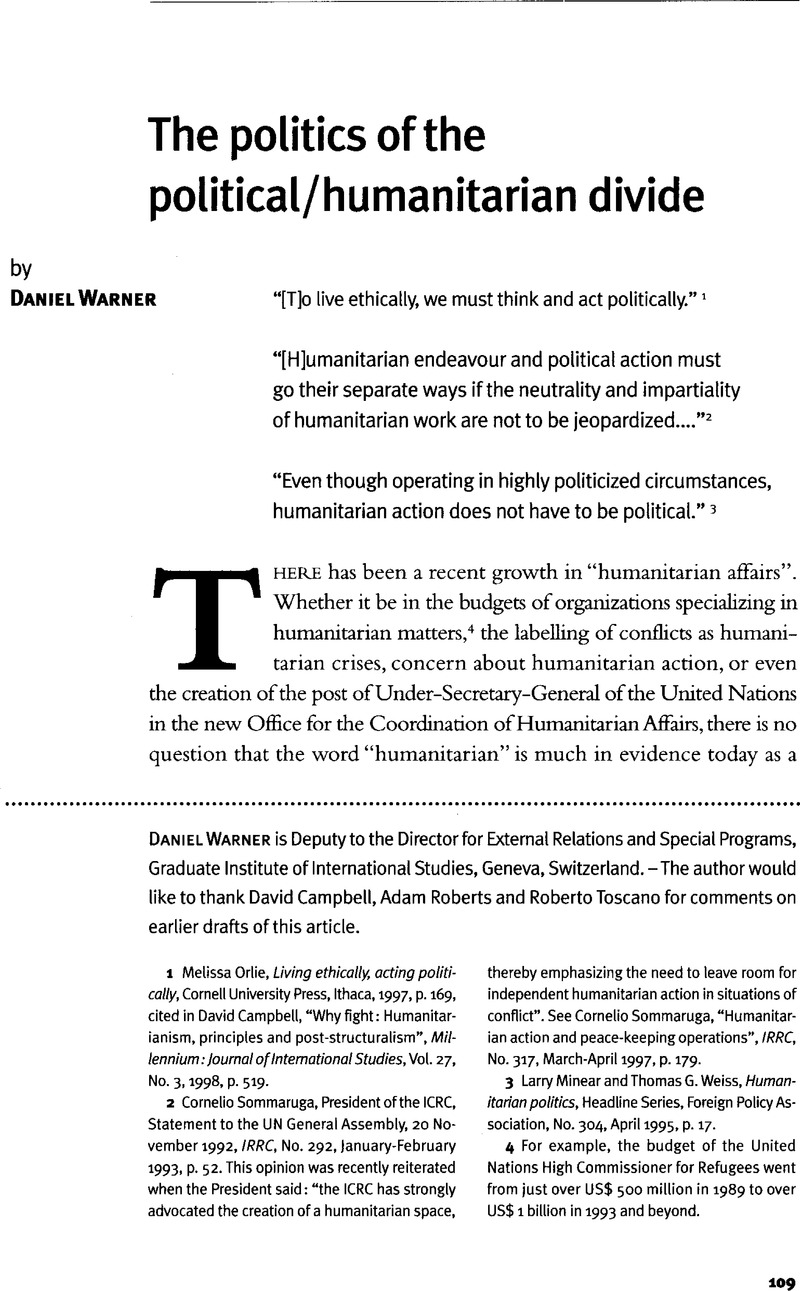Article contents
The politics of the political/humanitarian divide
Published online by Cambridge University Press: 19 April 2010
Abstract

- Type
- Research Article
- Information
- International Review of the Red Cross , Volume 81 , Issue 833: Débat humanitaire/Humanitarian Debate , March 1999 , pp. 109 - 118
- Copyright
- Copyright © International Committee of the Red Cross 1999
References
1 Orlie, Melissa, Living ethically, acting politically, Cornell University Press, Ithaca, 1997, p. 169Google Scholar, cited in Campbell, David, “Why fight: Humanitar-ianism, principles and post-structuralism”, Millennium: Journal of International Studies, Vol. 27, No. 3, 1998, p. 519.CrossRefGoogle Scholar
2 Sommaruga, Cornelio, President of the ICRC, Statement to the UN General Assembly, 20 November 1992, IRRC, No. 292, January-February 1993. P. 52.Google Scholar This opinion was recently reiterated when the President said: “the ICRC has strongly advocated the creation of a humanitarian space, thereby emphasizing the need to leave room for independent humanitarian action in situations of conflict”. See Sommaruga, Cornelio, “Humanitarian action and peace-keeping operations”, IRRC, No. 317, March-April 1997, p. 179.Google Scholar
3 Minear, Larry and Weiss, Thomas G., Humanitarian politics. Headline Series, Foreign Policy Association, No. 304, April 1995, p. 17.Google Scholar
4 For example, the budget of the United Nations High Commissioner for Refugees went from just over US$ 500 million in 1989 to over US$ 1 billion in 1993 and beyond.
5 Fora discussion on human rights somewhat similar to this article's perspective on humanitar-ianism, see Warner, Daniel, “An ethics of human rights: two interrelated misunderstandings”, Denver journal of International Law and Policy, Vol. 24, No. 2/3, Spring 1996, pp. 395–415.Google Scholar
6 I have briefly discussed this in a book review in Refugee Abstracts, Vol. 10, No. 1, March 1991, pp. 66–68.
7 A very readable recent presentation of Realism's modern manifestation is Michael Smith, Joseph, Realist thought from Weber to Kissinger, Louisiana State University Press, Baton Rouge, 1986.Google Scholar
8 For a wonderful engagement with Augustine, St, see Connolly, William, The Augustinian imperative: A reflection on the politics of morality, Sage Publications, Newbury Park, 1993.Google Scholar
9 Witness the title of a conference hosted in Britain in April 1998: “Principled aid in an unprincipled world”.
10 See Walzer, Michael, “Political action: The problem of dirty hands”, Philosophy and Public Affairs, No. 2, 1973, pp. 160–180.Google Scholar
11 Roberts, Adam, Humanitarian action in war: Aid, protection and impartiality in a policy vacuum, Adelphi paper No. 305, 1996, p. 7.Google Scholar
12 “International ethics do matter, although politics inevitably influence the contents of huma-nitarianism.” See Weiss, Thomas and Minear, Larry, “Do international ethics matter? Humanitarian politics in the Sudan”, Ethics & International Af-fairs, Vol 5, 1991, p. 214.Google Scholar
13 Minear, Larry and Weiss, Thomas G., op. cit., note 3, p. 13.Google Scholar
14 Indeed, there is an abundant literature by scholars rereading certain texts to try to show that Thucydides, Hobbes, , etc. were not that negative in what they saw in this world, and that modern Realism was part of a religious/political position specific to the United States and tied to its foreign policy positions in the 20th century. A good example of the latter would be John Vasquez, The power of power politics: A critique, Frances Pinter, London, 1983.Google Scholar
15 See Navari, Cornelia, “Hobbes and the Hobbesian tradition in international thought”, Millennium: Journal of International Studies, Vol 11, No. 3, 1982, pp. 203–221CrossRefGoogle Scholar, or Flatham, Richard, Thomas Hobbes: Skepticism, individuality and chastened politics, Sage Publications, Newbury Park, 1993.Google Scholar
16 See Walker, R.B.J., “The prince and ‘the pauper’: Tradition, modernity, and practice in the theory of international relations”, in Derian, James Der and Shapiro, Michael J. (eds.), Interna-tional/intertextual relations: Postmodern readings of woridpolitics, D.C. Heath and Co., Lexington, MA, 1989, pp. 25–48.Google Scholar
17 Special mention should be made of the Emerging Political Complexes Discussion Group in England and David Campbell's paper, op. cit., note 1. See also the excellent article by Ed-kins, Jenny, “Legality with a vengeance: Famines and humanitarian relief in ‘complex emergencies’”, Millennium: journal of International Studies, Vol. 25, No. 3, 1996, pp. 547–575.CrossRefGoogle Scholar
18 This is a simple answer to Adam Roberts' question: “Has the increased emphasis of governments on humanitarian action been an abdication of serious policy-making?” See Roberts, , op. cit., note 11, p. 9.Google Scholar
19 Ibid., p. 15.
20 Jenny Edkins, op. cit., note 17.
21 Responsibility understood here as being able or willing to respond, a distinction l owe to G.M. Dillon.
22 There is an interesting convergence here between conservatives who see little use for humanitarian activities and want to reduce the budgets of humanitarian organizations and all multilateral organizations and those who want to reduce humanitarian activities and put the political in the forefront by strengthening the political organs of multilateral diplomacy. The fact that both parties want humanitarianism to be reduced does not mean that their ultimate aims or understandings of politics should be confused.
23 This argument was developed in Warner, Daniel, An ethic of responsibility in international relations, Lynne Rienner Publishers, Boulder and London, 1991.Google Scholar
- 17
- Cited by


